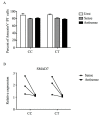A Novel Smad7 Genetic Variant Mapping on the Genomic Region Targeted by Mongersen Is Associated with Crohn's Disease
- PMID: 32707955
- PMCID: PMC7460430
- DOI: 10.3390/biomedicines8080234
A Novel Smad7 Genetic Variant Mapping on the Genomic Region Targeted by Mongersen Is Associated with Crohn's Disease
Abstract
Background: Down-regulation of Smad7 with a specific Smad7 antisense (AS) oligonucleotide-containing oral drug (Mongersen) was effective in pre-clinical studies and initial clinical trials in Crohn's disease (CD) patients. A recent phase 3 trial was discontinued due to an apparent inefficacy of the drug, but factors contributing to the failure of this study remain unknown. Here, we analysed the frequency in CD of rs144204026 C/T single nucleotide polymorphism (SNP), which maps on the corresponding region targeted by the Smad7 AS contained in the Mongersen formulation and examined whether such a variant allele affects the ability of Smad7 AS to knockdown Smad7.
Methods: rs144204026 SNP frequency was evaluated in two independent Italian cohorts of Crohn's disease patients and normal controls. Genotyping was performed by allelic discrimination assay. Smad7 expression was evaluated in wild-type or heterozygous PBMCs treated with Smad7 AS.
Results: No TT genotype was seen in CD patients and controls. Heterozygous genotype was more frequent in CD patients of both cohort 1 (11/235, 4.68%) and cohort 2 (8/122, 6.56%) as compared to controls (6/363, 1.65%; p = 0.029 and p = 0.01 respectively). Overall, a statistically significant association was observed between the T variant allele and CD patients' susceptibility (p = 0.008; OR = 3.28, 95%CI: 1.3-8.3). Smad7 AS down-regulated Smad7 RNA independently of the presence of the variant allele.
Conclusions: This is the first study to show an association between Smad7 rs144204026 SNP and CD patients. Data indicate that such a variant does not negatively influence the in vitro inhibitory effect of Smad7 AS on Smad7.
Keywords: Crohn’s disease; Smad7; inflammatory bowel disease; single nucleotide polymorphisms; ulcerative colitis.
Conflict of interest statement
GM has filed a patent related to the treatment of inflammatory bowel diseases with Smad7 antisense oligonucleotides. The remaining authors declare no conflict of interest.
Figures

References
-
- Monteleone G., Del Vecchio Blanco G., Monteleone I., Fina D., Caruso R., Gioia V., Ballerini S., Federici G., Bernardini S., Pallone F., et al. Post-transcriptional regulation of Smad7 in the gut of patients with inflammatory bowel disease. Gastroenterology. 2005;129:1420–1429. doi: 10.1053/j.gastro.2005.09.005. - DOI - PubMed
-
- Monteleone G., Mann J., Monteleone I., Vavassori P., Bremner R., Fantini M., Del Vecchio Blanco G., Tersigni R., Alessandroni L., Mann D., et al. A failure of transforming growth factor-beta1 negative regulation maintains sustained NF-kappaB activation in gut inflammation. J. Biol. Chem. 2004;279:3925–3932. doi: 10.1074/jbc.M303654200. - DOI - PubMed
LinkOut - more resources
Full Text Sources
Research Materials

